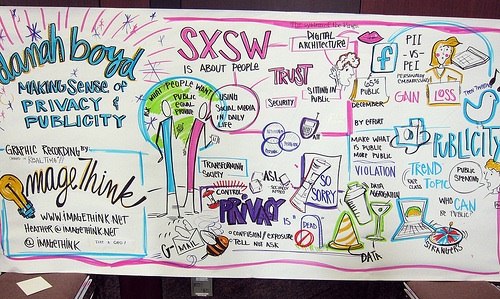SXSWi Speakers Wrap-Up: danah boyd
I’m back from Austin, slowly catching up in the office and working on synthesizing my thoughts from SXSW Interactive 2010. This was my second time attending, and there were a few things that I did differently and that were different in terms of the conference than in 2009. The SXSW experience contains many different parts, so I thought I’d break them down into more manageable bits versus one big overview post. I’m planning to break the pieces into the following parts, and if meaty enough a particular speaker or discussion might have its own post:
- Part One: Solo Speakers
- Part Two: Panel Discussions
- Part Three: Technology
- Part Four: Fun, Friends, Food
Part One: Solo Speakers
From my experience last year, I found that I get a lot from the best solo speakers as SXSW, and that panel discussions can be a bit more hit or miss. There were both keynote speakers each day and multiple sessions daily of what they called “featured speakers.” I arrived a bit later than anticipated Friday afternoon and stayed till Tuesday morning, but was able to fit in a lot of content between Saturday — Monday.
danah boyd
danah boyd delivered the Opening Remarks for the conference, and she was someone I was really looking forward to hear speak. She’s with the Harvard Berkman Center for Internet and Society and Microsoft Research New England, and her research into social media (and youth & teens in particular) is something I’ve shared in both my consulting and teaching work. Her talk at SXSW, “Making Sense of Privacy and Publicity,” centered on a few themes, and what I think she did particularly well was to shed light on the nuance of the debate around privacy online, which too often devolves into two extremes.
I took five pages of notes, but I’ll try to paraphrase what I saw as the main points from her talk:
- Privacy is about control of information flows. When people feel like they don’t have control of their information they feel like their privacy has been violated. This includes the opt-out versus opt-in debate.
- Technologists assume that the most optimized system is the best one, but forget about social values and social rituals. (e.g. discussion of Google Buzz launch)
- Merging worlds. Just because someone puts something online doesn’t mean they want it to be publicized (difference between public and publicity). There’s a security in obscurity – most people online have very few followers. Making something that’s public more public can be a violation of privacy.
- By continuing to argue that privacy is dead, technologists work to make data more public and things public that were never meant to be. We’re seeing a switch to public by default, private through effort.
- With privilege, it’s easy to take for granted things that not everyone gets to experience, and with privilege comes a different value proposition – what one person may gain from publicness, another person may lose. This affects not only groups sometimes thought of as marginalized (immigrants, victims of abuse, LGBT community), but also groups like teachers – they have more to lose by public information online. Public by default isn’t always a democratizer.
Her full unedited talk is available on her site here. I urge you to spend the time reading it, as I’ve captured only a small sliver of a very wise discussion.
[Note: this post is cross-posted on the Logos blog.]
Tweet
Thanks for the nice summary; I hope to be able to attend this event one day.
I’m very interested in the point you make about one person(or group of people) gaining, and another losing when certain information is made public. Do you believe clear lines exist in this balance or is everything judged on a case by case basis?
I automatically think of the numerous online registered sex offender databases. This information is made public because society feels it mitigates against potential future harm to the community at large from a group often known to re-offend.
Others argue that an individual who’s been tried, convicted, sentenced and served time in prison like any other criminal, shouldn’t be ostracized after already paying his or her debt to society i.e., it’s unfair to single someone out for what they may or may not do in the future.
I’m of course not defending or equating sex offenders with any of the groups you mentioned, but when do the needs or rights of the many, outweigh the needs or rights of the few or one? Always? (as Spock would say.) Who makes this value judgement in the online world?
Also, not that I’m challenging your point about teachers, but could you explain more or give an example? I was trying to think of one but can’t. Thanks.
Peter, you raise good points about the balance between groups gaining or losing when information is made public. I think an additional point that I got from the talk was that it’s not always an either/or proposition, or one group gaining with another group losing, but a case by case determination. For example, she talked about her ability to criticize, debate or tell her story publicly, without facing many consequences. But, an immigrant in fear of deportation may not be willing to criticize or talk publicly for fear of losing the basic rights he or she holds here. In that scenario, one person’s actions don’t affect the other person’s, but the two individuals may make different determinations of how much to share publicly based on their judgement of potential harms from sharing that information.
And the examples she used about teachers had to do with things like sharing dating information, photos of the teacher socializing or drinking with friends, religious information, etc. For many people still, teachers are “Teachers” both privately and publicly. danah asked if they are allowed to fully express themselves online publicly without fear of potential school or parental rebuke.